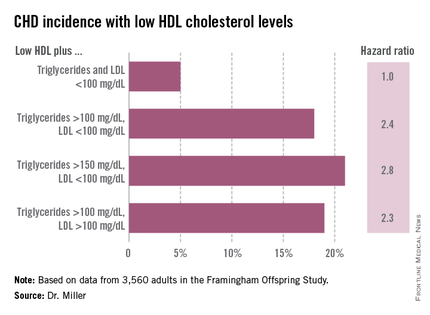WASHINGTON– Low HDL cholesterol does not increase the risk of coronary heart disease when LDL cholesterol and triglyceride levels are normal, according to an analysis from the Framingham Offspring Study.
"In the Framingham Offspring Study, isolated HDL levels lower than the median are associated with a low risk of CHD. These data suggest that isolated low HDL may not be an atherogenic phenotype, Dr. Michael Miller said at the annual meeting of the American College of Cardiology.
While it’s well established that low HDL is associated with increased CHD risk, the risk in patients with isolated low HDL hasn’t been well studied. Yet low HDL together with an LDL below 100 mg/dL and a triglyceride level below 100 mg/dL is not a rare combination. It represented 7.4% of all study participants with low HDL, as defined by a level below the median, meaning less than 42 mg/dL in men and 54 mg/dL in women, noted Dr. Miller, professor of medicine, epidemiology, and preventive medicine and director of the center for preventive cardiology at the University of Maryland, Baltimore.
He reported on 3,560 adults in the Framingham Offspring Study with baseline lipid measurements recorded in 1987-1991. During a mean follow-up of 18 years, the incidence of newly diagnosed CHD was low in participants with isolated low HDL: just 5%. That was similar to the 4% incidence in subjects with above average HDL and low LDL and triglycerides. In contrast, when low HDL was present in subjects with higher LDL and/or triglycerides, the incidence of CHD was higher. So was the relative risk of CHD in a multivariate analysis after adjustment for age, sex, smoking status, diabetes, and hypertension.
When low HDL was present in combination with an LDL greater than 130 mg/dL along with triglycerides elevated above cut points of 150 and 200 mg/dL, the incident CHD rates climbed to 20%-25%, with adjusted hazard ratios of 1.7-2, compared with the risk in subjects with isolated low HDL.
The Framingham Offspring Study is funded by the National Heart, Lung, and Blood Institute. Dr. Miller reported receiving a research grant from Amgen.



